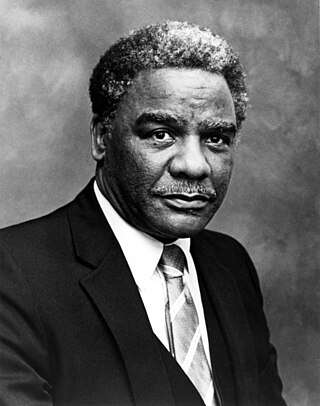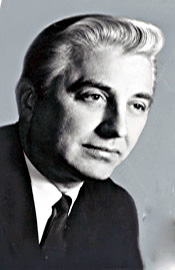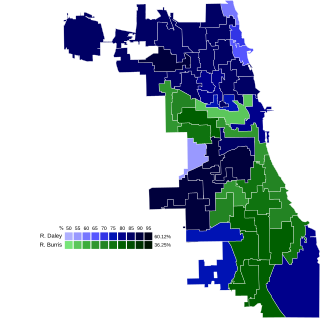
Jane Margaret Byrne was an American politician who served as the 50th mayor of Chicago from April 16, 1979, until April 29, 1983. Prior to her tenure as mayor, Byrne served as Chicago's commissioner of consumer sales from 1969 until 1977, the only female in the mayoral cabinet.

Harold Lee Washington was an American lawyer and politician who was the 51st Mayor of Chicago. Washington became the first African American to be elected as the city's mayor in April 1983. He served as mayor from April 29, 1983, until his death on November 25, 1987. Born in Chicago and raised in the Bronzeville neighborhood, Washington became involved in local 3rd Ward politics under Chicago Alderman and future Congressman Ralph Metcalfe after graduating from Roosevelt University and Northwestern University School of Law. Washington was a member of the U.S. House of Representatives from 1981 to 1983, representing Illinois's first district. Washington had previously served in the Illinois State Senate and the Illinois House of Representatives from 1965 until 1976.

Michael Anthony Bilandic was an American Democratic politician and attorney who served as the 49th mayor of Chicago from 1976 to 1979, after the death of his predecessor, Richard J. Daley. Bilandic practiced law in Chicago for several years, having graduated from the DePaul University College of Law. Bilandic served as an alderman in the Chicago City Council, representing the eleventh ward on the south-west side from June 1969 until he began his tenure as mayor in December 1976. After his mayoralty, Bilandic served as chief justice of the Illinois Supreme Court from 1994 to 1997.

Edward Robert Vrdolyak, also known as "Fast Eddie", is a former American politician and lawyer. He was a longtime Chicago alderman and the head of the Cook County Democratic Party until 1987 when he ran unsuccessfully for Mayor of Chicago on the Illinois Solidarity Party ticket. He subsequently ran again in 1989 on the Republican Party ticket. He was a prominent opponent of Harold Washington and the de facto leader of the so-called "Vrdolyak 29" that opposed and blocked many of Washington's measures.

Roman Conrad Pucinski was an American Democratic politician from Chicago, Illinois. He was a U.S. Representative from 1959 to 1973 and alderman from the 41st Ward of Chicago from 1973 to 1991. He was considered a longtime leader of Chicago Polonia and was seen to represent its interests in Washington.

The Cook County Democratic Party is an American county-level political party organization which represents voters in 50 wards in the city of Chicago and 30 suburban townships of Cook County. The organization has dominated Chicago politics since the 1930s. It relies on an organizational structure of a ward or township committeeperson to elect candidates. At the height of its influence under Richard J. Daley in the 1960s when political patronage in employment was endemic in American cities, it was one of the most powerful political machines in American history. By the beginning of the 21st century the party had largely ceased to function as a machine due to the legal dismantling of the patronage system under the Shakman Decrees issued by the federal court in Chicago. The current Chair is Toni Preckwinkle, who is also the elected Cook County Board president.

The Chicago mayoral election of 1995 resulted in the re-election of Democratic Party nominee incumbent Richard M. Daley over independent candidate Roland Burris, with 359,466 votes to Burris's 217,024. Daley won 60.1% of the total vote, winning by a landslide 24-point margin. The Republican candidate, Raymond Wardingley, fared poorly with only 2.8% of the vote. A fourth-place candidate, Harold Washington Party nominee Lawrence Redmond, won 0.9% of the votes.

The Chicago mayoral election of 1991 resulted in the re-election of incumbent Democrat Richard M. Daley to his first full-term. Daley had previously been elected to serve the remainder of Harold Washington's unexpired term in a special election held following Washington's death in office.

The Chicago mayoral election of 1989 saw Democratic nominee Richard M. Daley win election to the remainder of an unexpired mayoral term with a 14% margin of victory. This marked a return for the Daley family to the office of mayor. Daley was elected over Alderman Timothy Evans, the nominee of the newly formed Harold Washington Party, and the Republican nominee Ed Vrdolyak.

The Chicago mayoral election of 1987 was first the primary election on February 24, 1987 followed by the general election on April 7, 1987. The election saw the re-election of Chicago, Illinois' first African-American mayor, Harold Washington. Ed Vrdolyak, the leader of the Vrdolyak 29, unsuccessfully opposed him, running on the Illinois Solidarity Party ticket. Former mayor Jane Byrne, who served from 1979 until 1983 unsuccessfully challenged Washington in the Democratic primary.

The Chicago mayoral election of 1983 was first the primary on February 22, 1983, which was followed by the general on April 12, 1983. The election saw the election of Chicago's first African-American mayor, Harold Washington. Incumbent Mayor Jane Byrne, who had served since April 16, 1979 had lost renomination in the Democratic primary in a three-way race between herself, then–Congressman Washington, and then–Cook County State’s Attorney Richard M. Daley in February 1983. Washington would face off against Republican nominee Bernard Epton, winning with a 3.7% lead over Epton in the general election.

The 1979 Chicago mayoral election was first the primary on February 27, 1979, which was followed by the general on April 3, 1979. The election saw the election of Chicago, Illinois' first female mayor, and the first female mayor of any major American city, Jane M. Byrne. Byrne defeated Republican Wallace Johnson by a landslide 66 percent margin of victory, winning more than 82 percent of the vote. Byrne's 82% of the vote is the most any candidate has received in a Chicago mayoral election.
William Singer is an American lawyer, politician, consultant, and lobbyist who formerly served as a Chicago alderman, representing the 44th and 43rd wards during his aldermanic career.

The Chicago mayoral election of 1975 was held on April 1, 1975. Democratic Party incumbent Richard J. Daley was elected to a record sixth term as mayor by a landslide 59% margin over Republican nominee John J. Hoellen Jr. Only one other individual has since matched Daley's feat of winning six Chicago mayoral elections. This was the first Chicago mayoral election since the ratification of the Twenty-sixth Amendment to the United States Constitution, which lowered the voting age from 21 to 18.

Chicago has held regularly-scheduled popular elections to select the city's mayor ever since it was incorporated as a city in 1837.

The Chicago mayoral election of 1963 was held on April 2, 1963. The election saw Richard J. Daley elected to a third term as mayor, defeating Republican Ben Adamowski by a double-digit margin.

The 1955 Chicago mayoral election saw Democrat Richard J. Daley win election to his first term as mayor by a ten-point margin over Republican Robert E. Merriam. This was the narrowest margin of victory of any of Daley's mayoral races.

In the Chicago mayoral election of 1935, incumbent Interim Mayor Edward J. Kelly defeated Republican Emil C. Wetten and independent candidate Newton Jenkins by a landslide 60% margin of victory.

Dick Weldon Simpson is an American professor, author, politician, activist, political consultant, and filmmaker who formerly served as a Chicago alderman from 1971 through 1979.
Edmund L. Kelly is an American politician who formerly served as General Superintendent of the Chicago Park District and 47th Ward Democratic Committeeman.















